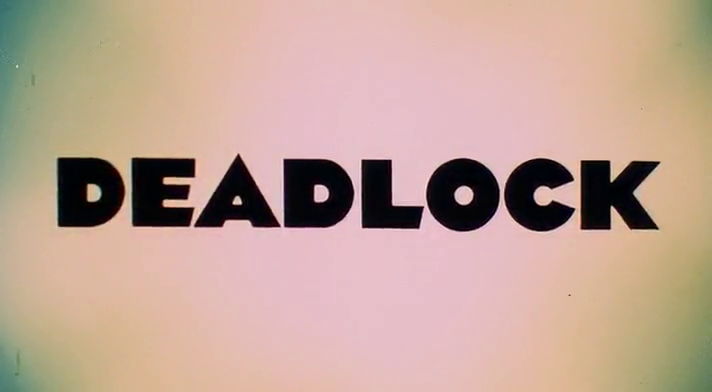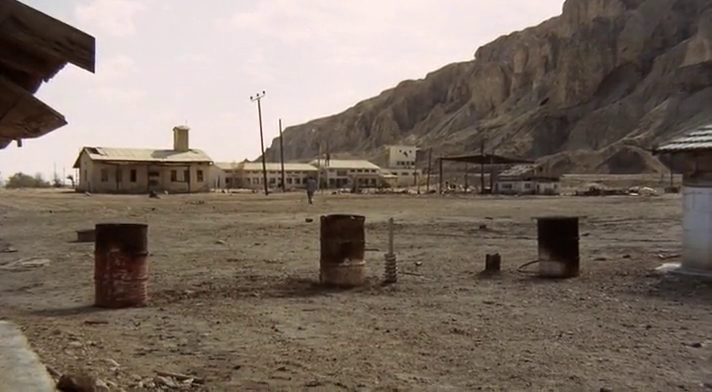#002 - Deadlock (1970)
/Deadlock (1970)
Directed by Roland Klick
Starring Mario Adorf, Anthony Dawson, Marquard Bohm, Mascha Rabben
Written by Roland Klick
DP: Robert van Ackeren
Music by Can
Edited by Jane Seitz
German cinema was in an interesting and awkward place in 1970. After 30 years of propaganda films, Heimatfilms and films that had no ambition in any way, it received new life from 1967 to 1969, as the New German Cinema wave erupted with new radicals like Alexander Kluge (Abschied von gestern), Volker Schlöndorff (Der junge Törless), Johannes Schaaf (Tätowierung) or May Spils (Zur Sache Schätzchen). These films were intellectual, angry and mostly aimed at the young revolutionaries of the ‘68 student protests. But except for Schlöndorff, all these names didn’t manage to continue their success and even Schlöndorff needed a while until he returned with Katharina Blum in 1975. There was Fassbinder, of course, but apart from him, German filmmakers had to think about which direction they wanted to take (and their competition were idiotic sex comedies like Schulmädchenreport Teil 1 that would flood cinemas with similar nonsense).
Roland Klick was part of that late 60s generation, establishing himself with the minor hit Bübchen (1968) that was in the same vein as Tätowierung and Schlöndorffs Mord und Totschlag. For his next project, he chose the most unusual conditions: a neo-western, filmed in Israel (for which he needed the project of the Israeli military), for which he put himself in high debt. No one made westerns in 1970, not the U.S., not Italy, France or Spain and definitely not Germany, where no cowboy hats had been used ever since the Karl May boom had ended.
First shot of ‘Deadlock’, showing the desolate location
It is about a loner named Charles Dump (played by Mario Adorf) who lives in barely-a-town named Deadlock when Kid (Marquard Bohm) arrives with a suitcase full of money. When his former partner Sunshine (Anthony Dawson) comes to town, things get ugly.
The movie’s style resembles spaghetti westerns but its somewhat modern setting places it in a region where no other movies live. It has only seven people in it, who don’t talk much, and the location of the desert/mining settlement never changes in its lifeless yellows, browns and whites. Together with music by the progrock band Can, the film feels like a fever dream, in which you are never sure what it all means. It could be argued that it was just an exercise in aping Leone and Peckinpah. Claudia Lenssen claims that the film ‘die Muster des Italo-Western für ein Stück halluzinatorisches Kino nutzte, hinter dem sich keine Botschaft verbarg.’ (Lenssen 2004) [‘uses the patterns of the Italo western for a piece of hallucinatory cinema, which has no hidden message’] and that it was just meant to showcase the rising star Marquard Bohm.
She certainly has a point, as it is difficult to figure out what the film is about. But maybe that is a fruitless venture, as it exemplifies the state of German cinema in 1970 quite well. Mining the energy of the revolutionaries is over and while looking at the American and Italian archetypes, it battles itself over the little money that is available for making films in the first place. A film tradition in limbo. From this perspective, it is a telling snapshot of where German filmmakers found themselves and for a couple of years, it hinged all on RWF to keep it afloat.
Last shot of ‘Deadlock’, with a little more hope but still desolate
It worked out for Klick, who received a major German award (granting him DM250,000), was allowed to show the film in Cannes, as it also was successful at the box office and supposedly was asked to work in Hollywood (by Spielberg, which seems like a very odd claim in 1970). His next film, Supermarkt (1973) became one of the most popular films of the 70s and while he worked less and less over the years, he managed to put his name in German film history books.
Silver German Film Award for Best Film
Sources
Lenssen, Claudia (2004). Film der siebziger Jahre. In: Jacobsen, W., Kaes, A., & Prinzler, H.H. (ed.), Geschichte des deutschen Films. J.B. Metzler.




